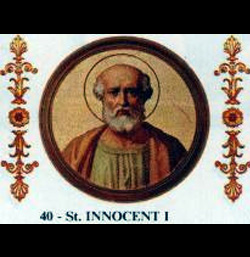Saint of the Day Online - St. Innocent I
Saint of the day online, Friday, March 28, 2017
28-07-2017
Saint Name: St Innocent I
Place: Italy
Birth: 401
Death: 417
Feast: July 28
St Innocent I was born at Albano on December 22, 401 at Italy. He became Pope, succeeding Pope During Innocent's pontificate, he emphasized papal supremacy, commending the bishops of Africa for referring the decrees of their councils at Carthage and Millevis in 416, condemning Pelagianism, to the Pope for confirmation. It was his confirmation of these decrees that caused Augustine to make a remark that was to echo through the centuries: "Roma locuta, causa finitas" (Rome has spoken, the matter is ended). Earlier Innocent had stressed to Bishop St. Victrius and the Spanish bishops that matters of great importance were to be referred to Rome for settlement. Innocent strongly favored clerical celibacy and fought the unjust removal of St. John Chrysostom. He vainly sought help from Emperor Honorius at Revenna when the Goths under Alaric captured and sacked Rome.
It was his confirmation of these decrees that caused Augustine to make a remark that was to echo through the centuries: "Roma locuta, causa finitas" (Rome has spoken, the matter is ended). Earlier Innocent had stressed to Bishop St. Victrius and the Spanish bishops that matters of great importance were to be referred to Rome for settlement. Innocent strongly favored clerical celibacy and fought the unjust removal of St. John Chrysostom. He vainly sought help from Emperor Honorius at Revenna when the Goths under Alaric captured and sacked Rome. Innocent died in Rome on March 12. His feast day is July 28th.
According to his biographer in the Liber Pontificalis, Innocent was a native of Albano Laziale and the son of a man called Innocentius, but his contemporary Jerome referred to him as the son of the previous pope, Anastasius I, probably a unique case of a son succeeding his father in the papacy. According to Urbano Cerri, Pope Innocent was a native of Albania.
Innocent I lost no opportunity in maintaining and extending the authority of the Roman Apostolic See, which was seen as the ultimate resort for the settlement of all ecclesiastical disputes. His communications with Victricius of Rouen, Exuperius of Toulouse, Alexander of Antioch and others, as well as his actions on the appeal made to him by John Chrysostom against Theophilus of Alexandria, show that opportunities of this kind were numerous and varied. He took a decided view on the Pelagian controversy, confirming the decisions of the synod of the province of proconsular Africa, held in Carthage in 416[citation needed], which had been sent to him, and also writing in the same year in a similar sense to the fathers of the Numidian synod of Mileve who had addressed him (Augustine of Hippo among them). In addition, he acted as Metropolitan over the bishops of Italia suburbicarian.
The historian Zosimus in his Historia Nova suggests that during the sack of Rome in 410 by Alaric I, Innocent I was willing to permit private pagan practices as a temporary measure. However, Zosimus also suggests that this attempt by pagans to restore public worship failed due to lack of public interest, suggesting that Rome had been successfully Christianized in the last century.
Among Innocent, I's letters are one to Jerome and another to John II, Bishop of Jerusalem, regarding annoyances to which the former had been subjected by the Pelagians at Bethlehem.
He died on 12 March 417. Accordingly, his feast day is now celebrated on 12 March, though from the thirteenth to the twentieth century he was commemorated on 28 July. His successor was Zosimus.